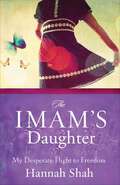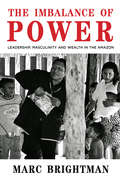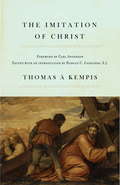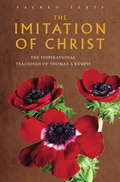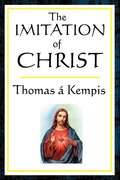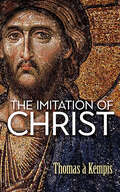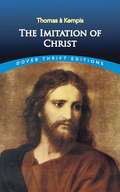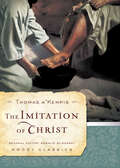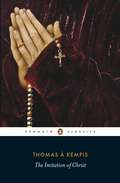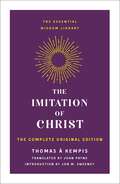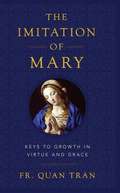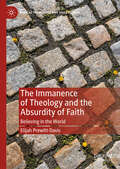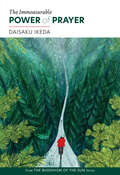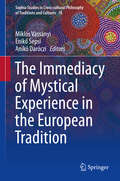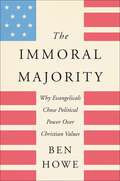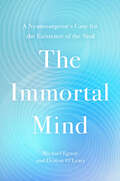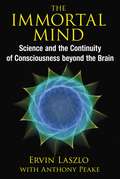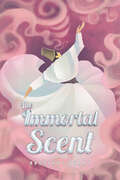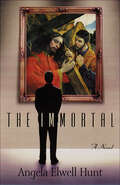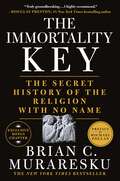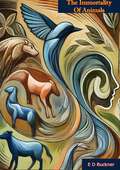- Table View
- List View
The Imam's Daughter: My Desperate Flight to Freedom
by Hannah ShahHannah Shah is an Imam's daughter. She lived the life of a devout Muslim in a family of Pakistani Muslims in England, but behind the front door, she was a caged butterfly.For many years, her father abused her in the cellar of their home. At sixteen, she discovered a plan to send her to Pakistan for an arranged marriage, and she gathered the courage to run away. Relentlessly hunted by her angry father and brothers, who were intent on executing an "honor" killing, she moved from house to house in perpetual fear to escape them. Over time, she converted to Christianity and was able to live and marry as she wished.Hannah found the courage to live her life free from shame, free from religious intolerance, and free from the abuse that haunted her childhood. This is a remarkable true story of how a young girl escaped a life of torture . . . a story you won't forget.
The Imbalance of Power: Leadership, Masculinity and Wealth in the Amazon
by Marc BrightmanAmerindian societies have an iconic status in classical political thought. For Montaigne, Hobbes, Locke, Hume and Rousseau, the native American ‘state of nature’ operates as a foil for the European polity. Challenging this tradition, The Imbalance of Power demonstrates ethnographically that the Carib speaking indigenous societies of the Guiana region of Amazonia do not fit conventional characterizations of ‘simple’ political units with ‘egalitarian’ political ideologies and ‘harmonious’ relationships with nature. Marc Brightman builds a persuasive and original theory of Amerindian politics: far from balanced and egalitarian, Carib societies are rife with tension and difference; but this imbalance conditions social dynamism and a distinctive mode of cohesion. The Imbalance of Power is based on the author’s fieldwork in partnership with Vanessa Grotti, who is working on a companion volume entitled Living with the Enemy: First Contacts and the Making of Christian Bodies in Amazonia.
The Imitation of Christ
by Thomas À Kempis Harold C. GardinerOnly the Bible has been more influential as a source of Christian devotional reading than The Imitation of Christ. This meditation on the spiritual life has inspired readers from Thomas More and St. Ignatius Loyola to Thomas Merton and Pope John Paul II. Written by the Augustinian monk Thomas à Kempis between 1420 and 1427, it contains clear instructions for renouncing worldly vanities and locating eternal truths. No book has more explicitly and movingly described the Christian ideal: "My son, to the degree that you can leave yourself behind, to that degree will you be able to enter into Me." With a new Foreword by Carl Anderson, the Supreme Knight and chief executive officer of the Knights of Columbus.
The Imitation of Christ
by Stephan MackennaThe saintly Thomas à Kempis's classic guide to the spiritual and religious life. A book which has been loved and revered by devout Christians throughout the ages. Transcending all sectarian divisions, it emphasises the importance of the inward journey.
The Imitation of Christ
by Stephan MackennaThe saintly Thomas à Kempis's classic guide to the spiritual and religious life. A book which has been loved and revered by devout Christians throughout the ages. Transcending all sectarian divisions, it emphasises the importance of the inward journey.
The Imitation of Christ
by Stephan MackennaThe saintly Thomas à Kempis's classic guide to the spiritual and religious life. A book which has been loved and revered by devout Christians throughout the ages. Transcending all sectarian divisions, it emphasises the importance of the inward journey.
The Imitation of Christ
by Thomas A. KempisThis classic, second only to the Bible for religious instruction and inspiration, has brought understanding and comfort to millions for centuries. Written in a candid and conversational style, the topics include liberation from worldly inclinations, preparation and consolations of prayer, and the place of eucharistic communion in a devout life.
The Imitation of Christ
by Thomas à KempisWritten by the pious monk Thomas á Kempis, this timeless masterpiece offers wisdom and hope by providing precepts we can use to draw nearer to God and learn how best to grow in holiness through obedience and love. In the realm of Christian devotional literature, this religious classic has illuminated countless souls over the ages, transcending the boundaries of denominations, beliefs, and the confines of time. Within these pages, a spiritual journey unfolds intimately in heartfelt prose, providing guidance in the resistance of worldly desires, the significance of mental recollection as a precursor to meditative prayer, and finding gratitude and strength in the soothing embrace of divine consolation and the sacred rite of Eucharistic communion. One of the most influential works in Christian literature, the book is an excellent resource for historians, mystics, and those seeking private devotion.
The Imitation of Christ (Dover Thrift Editions Ser.)
by Thomas À Kempis Harold Bolton Aloysius CroftThis classic of Christian devotional literature has brought understanding and comfort to millions for centuries. Both Protestants and Catholics — as well as mystics and historians of religious thought — have studied these meditations on the life and teachings of Jesus, finding in them a path to prayer and spiritual guidance. Written in a candid and conversational style, The Imitation of Christ discusses liberation from worldly inclinations, recollection as a preparation for prayer, the consolations of prayer, and the place of eucharistic communion in a devout life. With its simple, readable text, this translation will appeal to new readers as well as to those already familiar with this religious classic.
The Imitation of Christ (Moody Classics)
by Thomas A'KempisThomas a Kempis was not a haphazard follower of Jesus. The depth of his masterpiece mirrors the life of a man who did whatever was necessary to imitate his own Savior. A Kempis lived as intentionally as he wrote. We must turn away from the things of this world, we must live sacrificially, we must be inundated with Christ's passionate teaching, and we must pray to be removed from distraction.A classic in every state of the word, The Imitation of Christ places the fruit of one man's single-minded devotion to God's calling on his life within the reach of every reader. May we all commit to be this effective in our emulation of Jesus. Moody ClassicsOf all the factors influencing our spiritual growth and development, pivotal books play a key role. Learning from those who have walked the path and fought the fight brings wisdom and strengthens resolve. And hearing the familiar chords of kingdom living sung by voices from other times can penetrate cultural barriers that limit our allegiance to the King. To this end, Moody Publishers is honored to introduce the first six volumes in what is to be an ongoing series of spiritual classics. Selected for their enduring influence and timeless perspective, these new editions promise to shape the lives of spiritual pilgrims for generations to come.
The Imitation of Christ (Moody Classics)
by Thomas A'KempisThomas a Kempis was not a haphazard follower of Jesus. The depth of his masterpiece mirrors the life of a man who did whatever was necessary to imitate his own Savior. A Kempis lived as intentionally as he wrote. We must turn away from the things of this world, we must live sacrificially, we must be inundated with Christ's passionate teaching, and we must pray to be removed from distraction.A classic in every state of the word, The Imitation of Christ places the fruit of one man's single-minded devotion to God's calling on his life within the reach of every reader. May we all commit to be this effective in our emulation of Jesus. Moody ClassicsOf all the factors influencing our spiritual growth and development, pivotal books play a key role. Learning from those who have walked the path and fought the fight brings wisdom and strengthens resolve. And hearing the familiar chords of kingdom living sung by voices from other times can penetrate cultural barriers that limit our allegiance to the King. To this end, Moody Publishers is honored to introduce the first six volumes in what is to be an ongoing series of spiritual classics. Selected for their enduring influence and timeless perspective, these new editions promise to shape the lives of spiritual pilgrims for generations to come.
The Imitation of Christ (The\five Foot Shelf Of Classics Ser.)
by Thomas à KempisOne of the most influential and well-loved books of Christianity, The Imitation of Christ by Thomas à Kempis appears here in Penguin Classics in a new translation by Robert Jeffery, with an introduction by Max Von Habsburg, notes, a chronology and further reading.The Imitation of Christ is a passionate celebration of God's love, mercy and holiness, which has stimulated religious devotion for over five hundred years. With great personal conviction and deep humanity, Thomas à Kempis (1380-1471) demonstrates the individual's reliance on God and on the words of Christ, and the futility of a life without faith, as well as exploring the ideas such as humility, compassion, patience and tolerance. Thomas spent some seventy years of his life in the reclusive environment of monasteries, yet in this astonishing work he demonstrates an encompassing understanding of human nature, while his writing speaks to readers of every age and every nation.Thomas à Kempis was born at Kempen near Dusseldorf in 1380. He received the priesthood in 1413. Thomas wrote many other devotional works besides The Imitation of Christ, his masterpiece, as well as biographies of Gerald Groote and Florentius Radewyn. He died in 1471.The Very Revd Robert Jeffery was born in 1935 and ordained in 1959. He has written on matters of Church history, spirituality, mission and ecumenism. In 1978, he became Archdeacon of Salop, and was Dean of Worcester from 1987-96 and subsequently Canon and Sub-Dean of Christ Church, Oxford. He retired in 2002 and is an Hon Doctor of Divinity of Birmingham University.Max von Habsburg is the author of Catholic and Protestant Translations of the Imitatio Christi 1425-1650 (2011).
The Imitation of Christ: The Complete Original Edition (The Essential Wisdom Library)
by Thomas à KempisThomas à Kempis's The Imitation of Christ is a timeless devotional guide calling readers to a Christlike life, featuring an introduction by Jon M. Sweeney.One of the most beloved Christian devotionals, The Imitation of Christ was originally written in Latin during the fifteenth century and inspired countless readers to deepen their faith and build a stronger relationship with Christ. Kempis was focused on the contemplative, inner life and his work has been a trusted guide for generations of Christians in their own walks of faith.In the first two sections of the book, Kempis reflects on the spiritual and interior life, offering wisdom for those seeking to begin their own journey of reflection and contemplation. The final section of the book focuses on two imagined dialogues between Jesus and an unnamed disciple, which illuminate the totality of God’s love and grace.The Imitation of Christ is part of the Essential Wisdom Library, a series of books that seeks to bring spiritual wisdom—both modern and ancient—to today’s readers. This new edition of the classic text is a must read for seekers and believers alike.
The Imitation of Mary: How to Grow in Virtue and Merit God's Grace
by Quan D. TranIn this book, the author shows how to imitate the twelve essential qualities of Mary in order to unleash a torrent of graces in life. He explains that, like any gift, grace must be received, opened, and used. As you learn how, you'll begin to acquire the temperaments, dispositions, and qualities that are most pleasing to God, and you'll serve as a channel of God's grace for others.
The Immanence of Theology and the Absurdity of Faith: Believing in the World (Radical Theologies and Philosophies)
by Elijah Prewitt-DavisThe constant inundation of the affect and information experienced by contemporary individuals exposes the tragic nature of the world, making nihilism an epistemologically reasonable response. To counter the threat of nihilism, Elijiah Prewitt-Davis argues that knowledge must be replaced by belief. Against the common protestant concept of belief as strictly personal and interior, he proposes believing in the world as an absurd and immanent faith in the impossible—a belief that allows one to see and feel the potentialities simmering within the world as it is. Following Gilles Deleuze call to “transform belief,” Prewitt-Davis explores how belief heightens an affective attachment to our embeddedness on the world, revealing the potentialities with which time is always pregnant. Believing in the world as it is paradoxically becomes the mode of transforming the world inasmuch as the potential for something impossibly new is always immanently present.
The Immeasurable Power of Prayer (The Buddhism of the Sun)
by Daisaku IkedaDoes prayer work? What does it mean to pray in Buddhism? In a world where problems, both personal and global, seem out of our control, Buddhist philosopher Daisaku Ikeda explains the power of chanting Nam-myoho-renge-kyo: “ Daimoku is so powerful that there is nowhere in the universe it does not reach.” The Immeasurable Power of Prayer is a collection of essays where Daisaku Ikeda outlines the limitless power of prayer in Nichiren Buddhism. We learn that no matter how difficult our circumstances, through chanting, we develop the ability to take bold action, create value, and make positive changes.
The Immediacy of Mystical Experience in the European Tradition
by Miklós Vassányi Enikő Sepsi Anikó DarócziThis volume examines mystical experiences as portrayed in various ways by "authors" such as philosophers, mystics, psychoanalysts, writers, and peasant women. These "mystical authors" have, throughout the ages, attempted to convey the unsayable through writings, paintings, or oral stories. The immediate experience of God is the primary source and ultimate goal of these mystical expressions. This experience is essentially ineffable, yet all mystical authors, either consciously or unconsciously, feel an urge to convey what they have undergone in the moments of rapture. At the same time they are in the role of intermediaries: the goal of their self-expression - either written, painted or oral - is to make others somehow understand or feel what they have experienced, and to lead others toward the spiritual goal of human life. This volume studies the mystical experiences and the way they have been described or portrayed in West-European culture, from Antiquity to the present, from an interdisciplinary perspective, and approaches the concept of "immediate experience" in various ways.
The Immoral Majority: Why Evangelicals Chose Political Power Over Christian Values
by Ben HoweAn analysis of why and how the Religious Right could vote for Donald Trump in 2016, and how the movement can redeem itself and get back on track.In 2016, writer and filmmaker Ben Howe found himself disillusioned with the religious movement he’d always called home. In the pursuit of electoral victory, many American evangelicals embraced moral relativism and toxic partisanship.In The Immoral Majority, Howe—still a believer and still deeply conservative—analyzes and debunks the intellectual dishonesty and manipulative rhetoric that evangelical leaders use to convince Christians to toe the Republican Party line. He covers the history of the Christian Right, as well as the events of the last three decades that led to the current state of the conservative movement at large.As long as evangelicals prioritize power over persuasion, Howe argues, their pews will be empty and their national influence will dwindle. If evangelicals hope to avoid cultural irrelevance, it means valuing the eternal over the ephemeral, humility over ego, and resisting the seduction of political power, no matter the cost. The Immoral Majority demonstrates how the Religious Right is choosing the profits of this world at the cost of its soul—and why it’s not too late to change course.
The Immortal Mind: A Neurosurgeon's Case for the Existence of the Soul
by Denyse O'Leary Michael EgnorA neuroscientist and surgeon makes an argument for the existence of a spiritual human soul in this eye-opening book. Many scientists and doctors believe that there is no such thing as the soul. That there is no part of us that persists beyond death. We are not spiritual in any respect. We are made up of cells and tissue, and completely controlled by a material organ in our heads: the brain. In this groundbreaking book, Dr. Michael Egnor makes the case—based on 40 years of practice and over 7,000 brain surgeries—that science has gotten it all wrong. The human brain is incredible, mysterious, and powerful. But it&’s not what makes us who we are. The soul does that. Drawing on the most important research studies in neuroscience, Dr. Egnor presents evidence that the brain alone does not explain the mind. He explores, using modern neuroscience and his vast surgical experience, how inside every damaged brain there is a thinking, feeling person with a spiritual soul that transcends the brain. He also uses fascinating case studies to show how research on conjoined twins who share parts of their brains, on patients in deep coma who are still able to communicate with people around them, on near-death experiences, and on artificial intelligence all make a scientific case for the existence of the spiritual human soul. Engaging, thought-provoking, and groundbreaking, The Immortal Mind shows here that some aspect of who we are is spiritual and immortal, transcending the physical body.
The Immortal Mind: Science and the Continuity of Consciousness beyond the Brain
by Ervin Laszlo Anthony PeakeScientific evidence for the continual presence of consciousness with or without connection to a living organism • Examines findings on the survival of consciousness beyond life, including near-death experiences, after-death communication, and reincarnation • Explains how this correlates precisely with cutting-edge physics theories on superstrings, information fields, and energy matrices • Reveals how consciousness manifests in living beings to continue its evolution Evidence now points to consciousness existing beyond the brain, such as when the brain is temporarily incapacitated, as well as to the survival of consciousness after death. Conventional science prefers to dismiss these findings because they cannot be accommodated by a materialist view of reality. Spirituality and religion embrace the continuity of consciousness and ascribe it to a nonmaterial spirit or soul that is immortal. As such, spirituality/religion and science continually find conflict in their views. But what if there truly is no conflict? Based on a new scientific paradigm in sync with experience-based spirituality, Ervin Laszlo and Anthony Peake explore how consciousness is continually present in the cosmos and can exist without connection to a living organism. They examine the rapidly growing body of scientific evidence supporting the continuity of consciousness, including near-death experiences, after-death communication, reincarnation, and neurosensory information received in altered states. They explain how the persistence of consciousness beyond the demise of the body means that, in essence, we are not mortal--we continue to exist even when our physical existence has come to an end. This correlates precisely with cutting-edge physics, which posits that things in our plane of time and space are not intrinsically real but are manifestations of a hidden dimension where they exist in the form of superstrings, information fields, and energy matrices. With proof that consciousness is basic to the cosmos and immortal in its deeper, nonmanifest realm, Laszlo and Peake reveal the purpose of consciousness is to manifest in living beings in order to continuously evolve.
The Immortal Scent
by Dushyant Berry“Words breathe, and pages contain space in alternate dimensions. In me, is the world in you?” This is what this book says. The idea of this book is not to produce mere expressions. The book breathes and reflects on how love is a wormhole that connects different realities. The author’s innate wish to be everything is reflected in the verses as perspectives of beings and things and how they are connected with the ultimate truth. He treasures the magnificence of silence and its healing therapy in connecting with the universe inside the self, outside, and with the Divine. The book reveals the secrets of existence that are simple and apparent yet not commonly understood. The book is a journey into the dimensions of spirituality, gratitude, and humanity. Through the poems, the author portrays the journey of the self, from starting to be aware to reaching enlightenment . Each poem hides within it a multitude of dimensions, and at different times, the reader will find different meanings while reading the poems.
The Immortal: A Novel
by Angela Elwell HuntClaudia is stunned by Asher Genzano's story. Who is he? A fanatic? A religious zealot? A raving lunatic? Or is he what he says he is-a 2000-year-old man cursed with immortality and on a holy mission to prevent a global cataclysm?Her search for answers leads Claudia into the past where myth, history, and prophecy intertwine in ancient legends of the Wandering Jew, biblical warnings about the Antichrist, and eyewitness accounts of the Crucifixion, the Inquisition, the Holocaust. What Claudia learns challenges everything she believes . . . about life, love, and God.
The Immortality Key: The Secret History of the Religion with No Name
by Brian C. MurareskuTHE NEW YORK TIMES BESTSELLER As seen on The Joe Rogan Experience! A groundbreaking dive into the role psychedelics have played in the origins of Western civilization, and the real-life quest for the Holy Grail that could shake the Church to its foundations. The most influential religious historian of the 20th century, Huston Smith, once referred to it as the "best-kept secret" in history. Did the Ancient Greeks use drugs to find God? And did the earliest Christians inherit the same, secret tradition? A profound knowledge of visionary plants, herbs and fungi passed from one generation to the next, ever since the Stone Age? There is zero archaeological evidence for the original Eucharist – the sacred wine said to guarantee life after death for those who drink the blood of Jesus. The Holy Grail and its miraculous contents have never been found. In the absence of any hard data, whatever happened at the Last Supper remains an article of faith for today’s 2.5 billion Christians. In an unprecedented search for answers, The Immortality Key examines the archaic roots of the ritual that is performed every Sunday for nearly one third of the planet. Religion and science converge to paint a radical picture of Christianity’s founding event. And after centuries of debate, to solve history’s greatest puzzle. Before the birth of Jesus, the Ancient Greeks found salvation in their own sacraments. Sacred beverages were routinely consumed as part of the so-called Ancient Mysteries – elaborate rites that led initiates to the brink of death. The best and brightest from Athens and Rome flocked to the spiritual capital of Eleusis, where a holy beer unleashed heavenly visions for two thousand years. Others drank the holy wine of Dionysus to become one with the god. In the 1970s, renegade scholars claimed this beer and wine – the original sacraments of Western civilization – were spiked with mind-altering drugs. In recent years, vindication for the disgraced theory has been quietly mounting in the laboratory. The constantly advancing fields of archaeobotany and archaeochemistry have hinted at the enduring use of hallucinogenic drinks in antiquity. And with a single dose of psilocybin, the psychopharmacologists at Johns Hopkins and NYU are now turning self-proclaimed atheists into instant believers. But the smoking gun remains elusive. If these sacraments survived for thousands of years in our remote prehistory, from the Stone Age to the Ancient Greeks, did they also survive into the age of Jesus? Was the Eucharist of the earliest Christians, in fact, a psychedelic Eucharist? With an unquenchable thirst for evidence, Muraresku takes the reader on his twelve-year global hunt for proof. He tours the ruins of Greece with its government archaeologists. He gains access to the hidden collections of the Louvre to show the continuity from pagan to Christian wine. He unravels the Ancient Greek of the New Testament with the world’s most controversial priest. He spelunks into the catacombs under the streets of Rome to decipher the lost symbols of Christianity’s oldest monuments. He breaches the secret archives of the Vatican to unearth manuscripts never before translated into English. And with leads from the archaeological chemists at UPenn and MIT, he unveils the first scientific data for the ritual use of psychedelic drugs in classical antiquity. The Immortality Key reconstructs the suppressed history of women consecrating a forbidden, drugged Eucharist that was later banned by the Church Fathers. Women who were then targeted as witches during the Inquisition, when Europe’s sacred pharmacology largely disappeared. If the scientists of today have resurrected this technology, then Christianity is in crisis. Unless it returns to its roots. Featuring a Foreword by Graham Hancock, the NYT bestselling author of America Before.
The Immortality Of Animals: And The Relation Of Man As Guardian, From A Biblical And Philosophical Hypothesis
by E D BucknerE. D. Buckner’s "The Immortality of Animals: And The Relation of Man as Guardian, From a Biblical and Philosophical Hypothesis" offers a thought-provoking and compassionate exploration of the spiritual and moral status of animals. Combining rigorous biblical scholarship with philosophical inquiry, Buckner presents a compelling case for the immortality of animals and mankind’s responsibility towards them as their guardians.In this groundbreaking work, Buckner delves into the scriptures and philosophical traditions to argue that animals possess immortal souls and that their well-being is intertwined with human stewardship. He challenges conventional views on the spiritual nature of animals and invites readers to reconsider their ethical obligations towards the animal kingdom.Key themes include:Biblical Foundations: Buckner meticulously examines biblical texts, drawing on passages that suggest the spiritual significance of animals. He interprets these scriptures to support the notion of animal immortality and the divine mandate for humans to act as their caretakers.Philosophical Arguments: The book explores philosophical perspectives on the soul and immortality, comparing human and animal experiences. Buckner engages with the works of classical and contemporary philosophers to build a robust argument for the spiritual continuity of all living beings.Theological Reflections: Integrating theology and philosophy, Buckner reflects on the broader implications of animal immortality for understanding creation, salvation, and the afterlife. He offers a vision of a harmonious coexistence between humans and animals in the divine order.Practical Applications: The book provides practical guidance for applying these principles in daily life, encouraging readers to adopt more humane and ethical practices in their treatment of animals."The Immortality of Animals" is a profound and enlightening work that challenges readers to rethink their relationship with the animal world. E. D. Buckner’s thoughtful analysis and compassionate advocacy make this book a significant contribution to theological and philosophical discussions on animal rights and spirituality.
